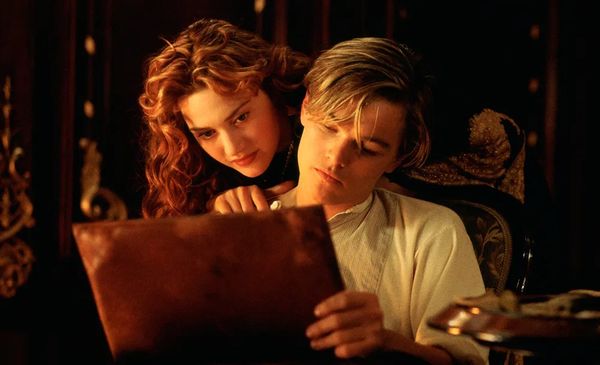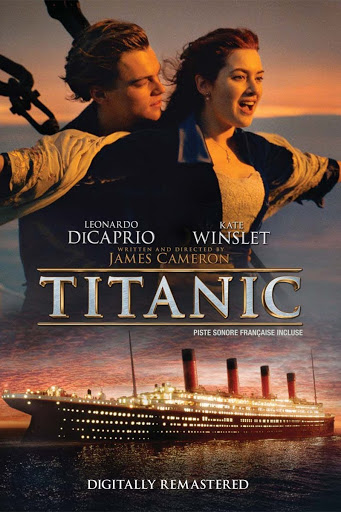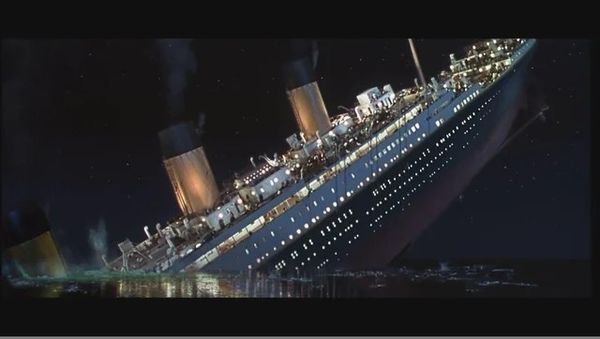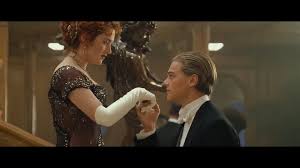Titanic (1997)

“Titanic” (1997): A Spectacular Epic Directed by James Cameron
Released in 1997, “Titanic” is a monumental romantic drama directed by James Cameron, known for his groundbreaking work in both action and romance films. Blending historical events with a fictional love story, “Titanic” captivated audiences worldwide and became a cultural phenomenon. With its stunning visuals, compelling narrative, and unforgettable performances, the film not only achieved commercial success but also garnered critical acclaim, winning 11 Academy Awards, including Best Picture and Best Director.
The story centers around the ill-fated maiden voyage of the RMS Titanic, focusing on the forbidden romance between Jack Dawson (Leonardo DiCaprio), a penniless artist, and Rose DeWitt Bukater (Kate Winslet), a young woman from an affluent family. Set against the backdrop of the ship’s tragic sinking, their love story unfolds in a society divided by class. As Rose grapples with the constraints of her upper-class life and an engagement to the wealthy but controlling Cal Hockley (Billy Zane), she finds herself drawn to Jack’s free-spirited nature. Their relationship blossoms amidst the opulence of the Titanic, but the impending disaster looms over them, creating a gripping tension that drives the narrative.

James Cameron’s direction is characterized by his meticulous attention to detail and grand storytelling. The film’s production design and visual effects are nothing short of extraordinary, bringing the Titanic to life with stunning accuracy. Cameron’s dual focus on romance and disaster allows for a rich emotional experience, drawing viewers into both the personal stakes of the characters and the larger tragedy of the ship’s sinking. The film’s pacing masterfully balances the development of Jack and Rose’s relationship with the escalating tension leading to the iceberg collision, ensuring that audiences remain engaged throughout.

“Titanic” is primarily classified as a romantic drama, but it also incorporates elements of historical fiction and disaster film. The film explores themes of love, sacrifice, and social inequality, highlighting the stark contrasts between different social classes. Through Jack and Rose’s relationship, Cameron critiques the rigid class structures of the early 20th century, illustrating how love can transcend societal boundaries. The tragic fate of the Titanic serves as a powerful metaphor for the fragility of life and the inevitability of fate, resonating deeply with audiences.

The performances in “Titanic” are iconic, with Leonardo DiCaprio and Kate Winslet delivering heartfelt portrayals that have become synonymous with their careers. DiCaprio’s charm and charisma as Jack, combined with Winslet’s strength and vulnerability as Rose, create a captivating on-screen chemistry. The supporting cast, including Billy Zane, Kathy Bates, and Bill Paxton, enrich the narrative, providing depth and context to the unfolding tragedy.

Upon its release, “Titanic” received widespread acclaim, breaking numerous box office records to become the highest-grossing film of all time until it was surpassed by “Avatar,” also directed by Cameron. Critics praised its ambitious scope, emotional depth, and technical achievements, solidifying its status as a cinematic landmark. The film’s score, composed by James Horner, features the hauntingly beautiful song “My Heart Will Go On,” performed by Celine Dion, further embedding it into popular culture.
In conclusion, “Titanic” is a masterful epic that showcases James Cameron’s directorial brilliance and the extraordinary talents of its cast. With its breathtaking visuals, compelling narrative, and exploration of love and loss, the film offers an unforgettable cinematic experience. As it intertwines personal and historical tragedy, “Titanic” stands as a testament to the power of storytelling, inviting viewers to reflect on the enduring nature of love amidst the chaos of life. Its legacy continues to resonate, making it a timeless classic in the annals of film history.











